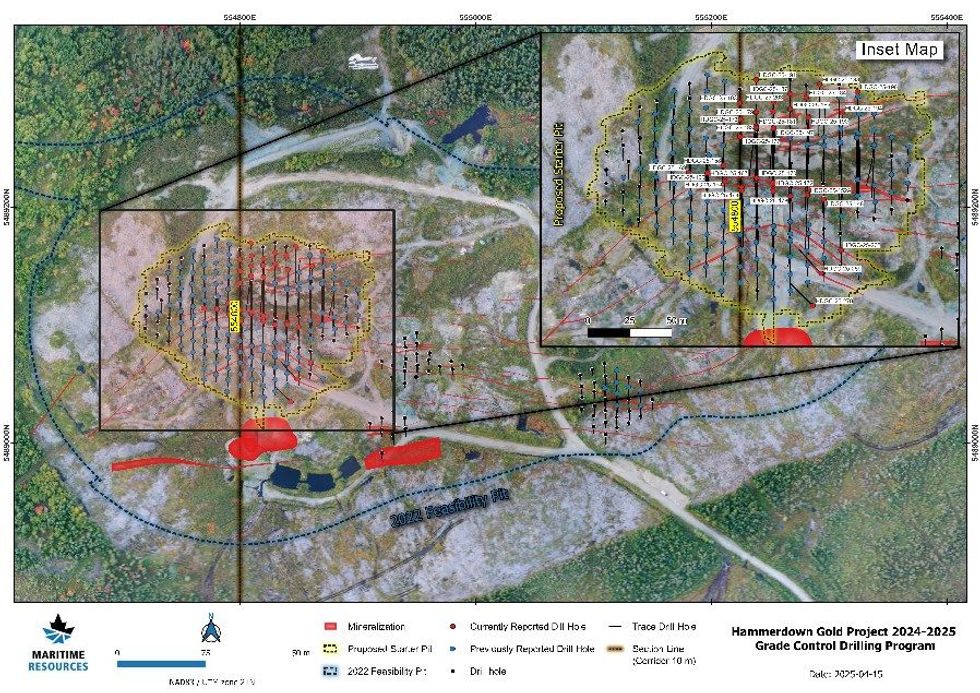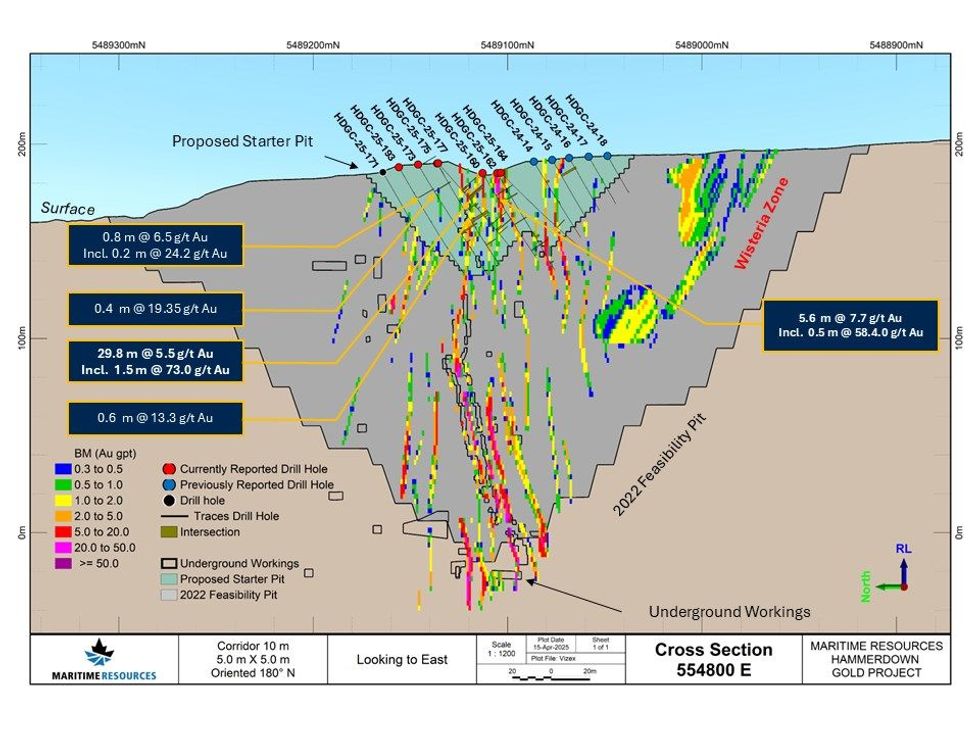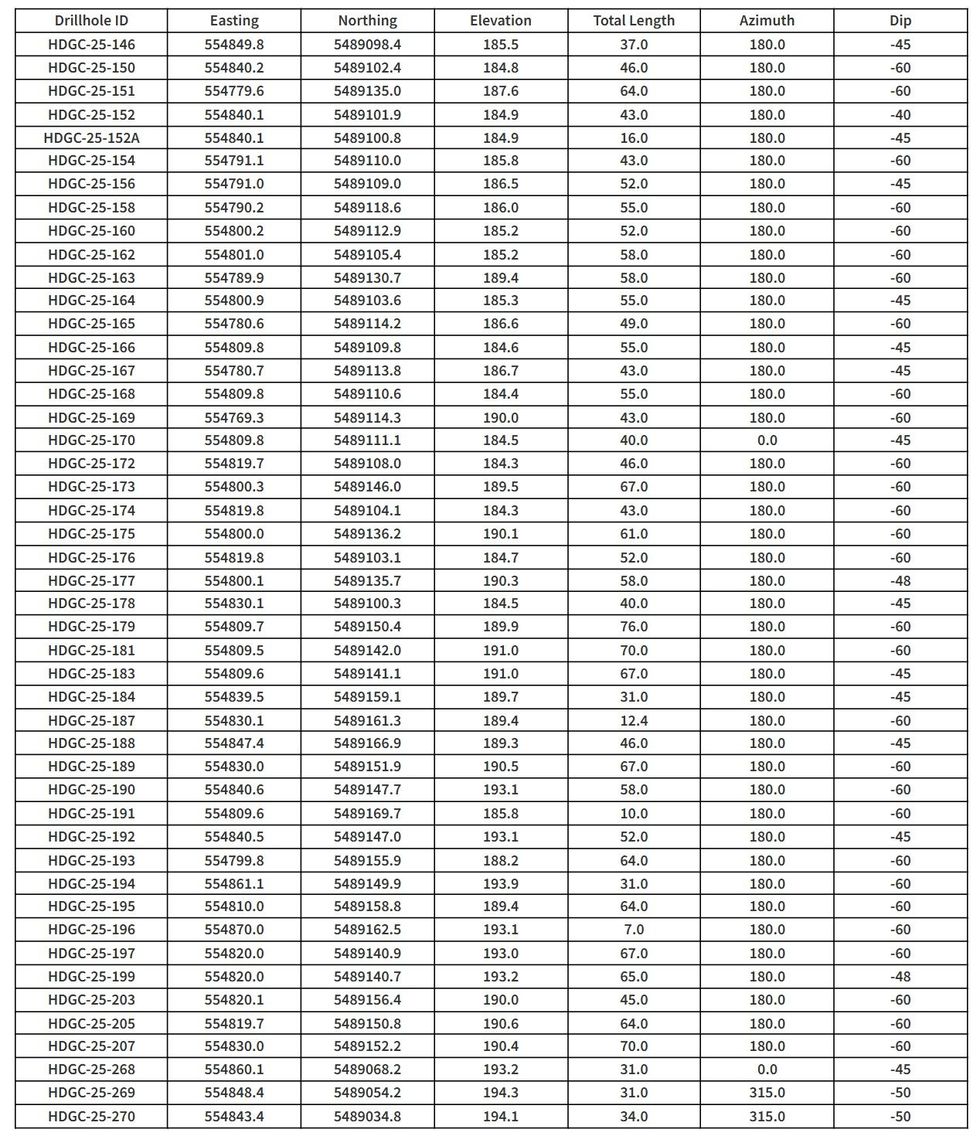
April 17, 2025
Maritime Resources Corp. (TSXV: MAE) (OTC Pink: MRTMF) ("Maritime" or the "Company") is pleased to announce additional drill results from a grade control drill program at the Hammerdown Gold Project. Hammerdown is located in the Baie Verte mining district of Newfoundland and Labrador, near the towns of King's Point and Springdale.
Highlights:
- 5.5 grams per tonne ("gpt") gold ("Au") over 29.8 metres ("m"), including 73.0 gpt Au over 1.5 m in drill hole HDGC-25-177
- 16.9 gpt Au over 2.5 m in drill hole HDGC-25-181
- 7.7 gpt Au over 5.6 m in drill hole HDGC-25-160
- 67.1 gpt Au over 0.9 m in drill hole HDGC-25-188
- 14.8 gpt Au over 5.9 m and 17.0 gpt Au over 4.4 m in historical underground mining backfill in drill holes HDGC-25-189 and HDGC-25-175, respectively
- 151 historical underground mining backfill samples collected during the grade control program representing 274 linear meters of drilling returned an average grade of 3.3 gpt Au
Discussion of Results
The latest drill results cover the central portion of the proposed first year of open pit mining at Hammerdown. The grade control program continues to confirm the vein model and location of the historic underground workings while identifying additional mineralization between the high-grade veins, mine backfill material and remnant pillars. Notable assay results include drill hole HDGC-25-177 which intersected 5.5 gpt Au over 29.8 m, including 73.0 gpt Au over 1.5 m related to a group of mineralized quartz veins and altered mineralized quartz feldspar porphyry (QFP) within the unmined crown pillar. Drill hole HDGC-25-160 was drilled 20 m south of drill hole HDGC025-177 and returned 7.7 gpt Au over 5.6 m. Drill hole HDGC-25-188, located 20 m north of previously reported HDGC-25-118 (27.9 gpt Au over 1.0 m; see Maritime press release dated March 14, 2025), returned several high-grade gold intercepts. Highlights include 15.0 gpt Au over 1.4 m, 67.1 gpt Au over 0.9 m, and 14.6 gpt Au over 0.2 m.
The Hammerdown grade control program has identified high grade gold mineralization within the historic backfilled stopes. Drill hole HDGC-25-189 returned 14.8 gpt Au over 5.9 m and HDGC-25-175 returned 17.0 gpt Au over 4.4 m. These results enhance the confidence in the mineralization surrounding and inside the previously mined out stopes at Hammerdown. All backfill intervals drilled during the grade control program were sampled and resulted in the collection of 151 samples representing 274 linear metres of drilling with a weighted average of 3.3 gpt Au across a 1 m composite length. The backfill gold content is believed to be the result of a combination of the high historic mine cut-off grade as well as high grade loss on mining material remaining during the cut and fill mining process. The potential quantity and grade of the backfill material are conceptual in nature and there has been insufficient sampling to define a mineral resource. It is uncertain whether further sampling would result in the backfill material being delineated as a mineral resource.
Grade Control Drilling
The grade control drill program completed 8,460 metres of diamond drilling in 273 drill holes. The program was designed to intersect the sub vertical mineralization on a 10 m x 10 m staggered pattern to maximize future ore extraction while minimizing ore losses and dilution. Assay results will be released as they become available.



Lengths reported relative to core access are estimated to be approximately 70% true thickness.

Qualified Person
Exploration activities at the Hammerdown Gold Project are administered on site by the Company's Exploration Manager, Larry Pilgrim, P.Geo. In accordance with National Instrument 43-101 Standards of Disclosure for Mineral Projects, Larry Pilgrim, P.Geo. Exploration Manager, is the Qualified Person for the Company and has prepared, validated and approved the technical and scientific content of this news release. The Company strictly adheres to CIM Best Practices Guidelines in conducting, documenting, and reporting its exploration activities on its exploration projects.
Analytical Procedures
All samples assayed and pertaining to this press release were completed by Eastern Analytical Limited (EAL) located at Springdale, Newfoundland and Labrador. EAL is an ISO 17025:2005 accredited laboratory for a defined scope of procedures. EAL has no relationship to Maritime Resources. Drill core samples are collected from NQ sized diamond drill core and sawn in half. The half core samples are delivered in sealed plastic bags to EAL by Maritime field crews where they are dried, crushed, and pulped. Samples are crushed to approximately 80% passing a minus 10 mesh and split using a riffle splitter to approximately 250 grams. A ring mill is used to pulverize the sample split to 95% passing a minus 150 mesh. Sample rejects are securely stored at the EAL site for future reference. A 30-gram representative sample is selected for analysis from the 250 grams after which EAL applies a fire assay fusion followed by acid digestion and analysis by atomic absorption for gold analysis. Other metals were analyzed by applying an acid digestion and 34 element ICP analysis finish. EAL runs a comprehensive QA/QC program of standards, duplicates and blanks within each sample stream.
About Maritime Resources Corp.
Maritime (TSXV: MAE) (OTC Pink: MRTMF) is a gold exploration and development company focused on advancing the Hammerdown Gold Project in the Baie Verte District of Newfoundland and Labrador, a top tier global mining jurisdiction. Maritime holds a 100% interest directly and subject to option agreements entitling it to earn 100% ownership in the Green Bay Property which includes the former Hammerdown gold mine and the Orion gold project. Maritime controls over 439 km2 of exploration land including the Green Bay, Whisker Valley, Gull Ridge and Point Rousse projects. Mineral processing assets owned by Maritime in the Baie Verte mining district include the Pine Cove mill and the Nugget Pond gold circuit.
On Behalf of the Board:
MARITIME RESOURCES CORP.
Garett Macdonald, MBA, P.Eng.
President and CEO
Phone: (416) 365-5321
info@maritimegold.com
www.maritimeresourcescorp.com
Twitter
Facebook
LinkedIn
YouTube
Caution Regarding Forward Looking Statements:
Certain of the statements made and information contained herein is "forward-looking information" within the meaning of National Instrument 51-102 - Continuous Disclosure Obligations. Forward-looking statements are often identified by terms such as "will", "may", "should", "anticipate", "expects", "intends", "indicates" "plans" and similar expressions. Forward-looking statements include, but are not limited to, statements concerning the Hammerdown mineralization, its' metallurgical response, precious metal extraction based on the ongoing metallurgical testwork, sampling programs, the grade control drilling program, location and grade of underground workings and backfill material, amongst other things, which involve known and unknown risks, uncertainties and other factors which may cause the actual results, performance or achievements of the Company, or industry results, to be materially different from any future results, performance or achievements expressed or implied by such forward-looking information. All forward-looking statements and forward-looking information are based on reasonable assumptions that have been made by the Company in good faith as at the date of such information. Such assumptions include, without limitation, the price of and anticipated costs of recovery of, base metal concentrates, gold and silver, the presence of and continuity of such minerals at modeled grades and values, the capacities of various machinery and equipment, the use of ore sorting technology will produce positive results, the availability of personnel, machinery and equipment at estimated prices, mineral recovery rates, and others. Forward-looking information is subject to a variety of risks and uncertainties which could cause actual events or results to differ from those reflected in the forward-looking information, including, without limitation, the ability of the Company to continue to be able to access the capital markets for the funding necessary to acquire, maintain and advance exploration properties or business opportunities; global financial conditions, including competition within the industry to acquire properties of merit or new business opportunities, and competition from other companies possessing greater technical and financial resources; difficulties in advancing towards a development decision and executing exploration programs on the Company's proposed schedules and within its cost estimates, whether due to weather conditions, availability or interruption of power supply, mechanical equipment performance problems, natural disasters or pandemics in the areas where it operates; increasingly stringent environmental regulations and other permitting restrictions or maintaining title or other factors related to exploring of its properties, such as the availability of essential supplies and services; factors beyond the capacity of the Company to anticipate and control, such as the marketability of mineral products produced from the Company's properties; uncertainty as to whether mineral resources will ever be converted into mineral reserves once economic considerations are applied; uncertainty as to whether inferred mineral resources will be converted to the measured and indicated categories through further drilling, or into mineral reserves, once economic considerations are applied; government regulations relating to health, safety and the environment, and the scale and scope of royalties and taxes on production; and the availability of experienced contractors and professional staff to perform work in a competitive environment and the resulting adverse impact on costs and performance and other risks and uncertainties, including those described in each MD&A of financial condition and results of operations. In addition, forward-looking information is based on various assumptions including, without limitation, assumptions associated with exploration results and costs and the availability of materials and skilled labour. Should one or more of these risks and uncertainties materialize, or should underlying assumptions prove incorrect, actual results may vary materially from those described in forward-looking statements. Accordingly, readers are advised not to place undue reliance on forward-looking information. Except as required under applicable securities legislation, Maritime undertakes no obligation to publicly update or revise forward-looking information, whether as a result of new information, future events or otherwise.
Neither the TSX Venture Exchange ("TSX-V") nor its Regulation Services Provider (as that term is defined in the policies of the TSX-V) accepts responsibility for the adequacy or accuracy of this release.
MAE:CC
The Conversation (0)
4h
Investor Presentation
Aurum Resources (AUE:AU) has announced Investor PresentationDownload the PDF here. Keep Reading...
21h
Armory Mining To Conduct a Series of Airborne Geophysics Surveys at the Ammo Gold-Antimony Project
(TheNewswire) Vancouver, B.C. TheNewswire - February 9, 2026 Armory Mining Corp. (CSE: ARMY) (OTC: RMRYF) (FRA: 2JS) (the "Company" or "Armory") a resource exploration company focused on the discovery and development of minerals critical to the energy, security and defense sectors, is pleased to... Keep Reading...
06 February
Editor's Picks: Is Gold and Silver's Price Correction Over?
It's been a wild couple of weeks for gold and silver. After surging to record highs at the end of January, prices for both precious metals saw significant corrections, creating turmoil for market participants.This week brought some relief, with gold bouncing back from its low point and even... Keep Reading...
06 February
Blackrock Silver to Present at the Precious Metals and Critical Minerals Virtual Investor Conference on February 10th 2026
Blackrock Silver Corp. (TSXV: BRC,OTC:BKRRF) (OTCQX: BKRRF) (FSE: AHZ0) ("Blackrock" or the "Company") is pleased to announce that Andrew Pollard, President & Chief Executive Officer of the Company, will present live at the Precious Metals & Critical Minerals Virtual Investor Conference hosted... Keep Reading...
05 February
Experts: Gold's Fundamentals Intact, Price Could Hit US$7,000 in 2026
Gold took center stage at this year's Vancouver Resource Investment Conference (VRIC), coming to the fore in a slew of discussions as the price surged past US$5,000 per ounce. Held from January 25 to 26, the conference brought together diverse experts, with a focus point being the "Gold... Keep Reading...
05 February
Barrick Advances North American Gold Spinoff After Record 2025 Results
Toronto-based company Barrick Mining (TSX:ABX,NYSE:B) said it will move ahead with plans to spin off its North American gold assets after a strong finish to 2025.The company's board has authorized preparations for an initial public offering (IPO) of a new entity that would house its premier... Keep Reading...
Latest News
Interactive Chart
Latest Press Releases
Related News
TOP STOCKS
American Battery4.030.24
Aion Therapeutic0.10-0.01
Cybin Corp2.140.00





